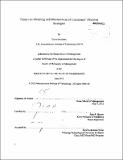Essays on modeling and measurement of consumers' decision strategies
Author(s)
Dzyabura, Daria
DownloadFull printable version (6.640Mb)
Alternative title
Modeling and measurement of consumers' decision strategies
Other Contributors
Sloan School of Management.
Advisor
John R. Hauser.
Terms of use
Metadata
Show full item recordAbstract
This thesis consists of three related essays which explore new approaches to modeling and measurement of consumer decision strategies. The focus is on decision strategies that deviate from von Neumann-Morgenstern utility theory. Essays 1 and 2 explore decision rules that consumers use to form their consideration sets. Essay 1 proposes disjunctions-of-conjunctions (DOC) decision rules that generalize several well-studied decision models. Two methods are proposed for estimating the model. Consumers' consideration sets for global positioning systems are observed for both calibration and validation data. For the validation data, the cognitively simple DOC-based methods predict better than the ten benchmark methods on an information theoretic measure and on hit rates. The results are robust with respect to format by which consideration is measured, sample, and presentation of profiles. Essay 2 develops and tests an active-machine-learning method to select questions adaptively when consumers use heuristic decision rules. The method tailors priors to each consumer based on a "configurator." Subsequent questions maximize information about the decision heuristics (minimize expected posterior entropy). To update posteriors after each question the posterior is approximated with a variational distribution and uses belief-propagation. The method runs sufficiently fast to select new queries in under a second and provides significantly and substantially more information per question than existing methods based on random, market-based, or orthogonal questions. The algorithm is tested empirically in a web-based survey conducted by an American automotive manufacturer to study vehicle consideration. Adaptive questions outperform market-based questions when estimating heuristic decision rules. Heuristics decision rules predict validation decisions better than compensatory rules. Essay 3 proposes a model of product search when preferences are constructed during the process of search: consumers learn what they like and dislike as they examine products. Product recommendations, whether made by sales people or online recommendation systems, bring products to the consumer's attention and impact his/her preferences. Changing preferences changes the products the consumer will choose to search; at the same time, the products the consumer chooses to search will determine the future shifts in preferences. Accounting for this two-way relationship between products and preferences is critical in optimizing recommendations.
Description
Thesis (Ph. D.)--Massachusetts Institute of Technology, Sloan School of Management, 2012. Cataloged from PDF version of thesis. Includes bibliographical references.
Date issued
2012Department
Sloan School of ManagementPublisher
Massachusetts Institute of Technology
Keywords
Sloan School of Management.